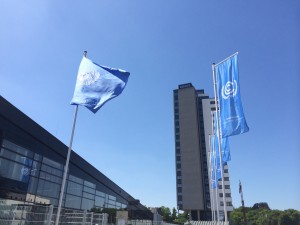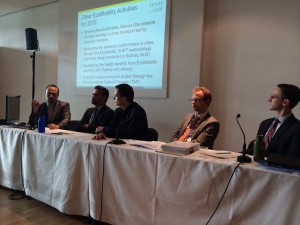Transport Tackles Climate Change – Summary and Presentations
 About 50 participants attended the side event “Transport Tackles Climate Change” on 04 June in Bonn. Five initiatives were presented that aim at strengthening the role of the transport sector in climate change policy and ensuring effective implementation of sustainable, low carbon transport in a forthcoming climate agreement at COP21.
About 50 participants attended the side event “Transport Tackles Climate Change” on 04 June in Bonn. Five initiatives were presented that aim at strengthening the role of the transport sector in climate change policy and ensuring effective implementation of sustainable, low carbon transport in a forthcoming climate agreement at COP21.
Download: The presentations can be downloaded here
Karl Peet (Partnership on Sust ainable, Low Carbon Transport, SLoCaT) introduced the Paris Process on Mobility and Climate (PPMC) which was initiated by SLoCaT and the Michelin Challenge Bibendum to strengthen the voice of the transport community in the UNFCCC process, to support implementation at all levels, and to engage actively before, during and after COP21. He presented examples of knowledge products on emissions assessments, policy analysis and climate finance, and discussed PPMC’s support for the transport commitments made at the Secretary General’s Climate Summit in September 2014 (and where appropriate, support for the Lima Paris Action Agenda). www.ppmc-cop21.org
ainable, Low Carbon Transport, SLoCaT) introduced the Paris Process on Mobility and Climate (PPMC) which was initiated by SLoCaT and the Michelin Challenge Bibendum to strengthen the voice of the transport community in the UNFCCC process, to support implementation at all levels, and to engage actively before, during and after COP21. He presented examples of knowledge products on emissions assessments, policy analysis and climate finance, and discussed PPMC’s support for the transport commitments made at the Secretary General’s Climate Summit in September 2014 (and where appropriate, support for the Lima Paris Action Agenda). www.ppmc-cop21.org
Yunus Arikan (ICLEI) shared the concept of “EcoMobility”, which includes travel by integrated,  socially inclusive and environmentally-friendly transport options, in the context of an experiment with car-free cities. During one month in September 2013, a neighbourhood in Suwon, Korea, got along without cars, opting instead for walking, wheeling and using mass transit. A second edition of this initiative is planned for a neighbourhood of Johannesburg in October 2015. www.ecomobility.org
socially inclusive and environmentally-friendly transport options, in the context of an experiment with car-free cities. During one month in September 2013, a neighbourhood in Suwon, Korea, got along without cars, opting instead for walking, wheeling and using mass transit. A second edition of this initiative is planned for a neighbourhood of Johannesburg in October 2015. www.ecomobility.org
Oliver Lah (Wuppertal Institut) presented on two initiatives. The German Partnership for Sustainable Mobility (GPSM) provides access to know-how by connecting authorities and stakeholders to German mobility and logistics expertise. It supports the international dialogue on sustainable transport and it provides a link to financing options for stakeholders from the developing world. www.german-sustainable-mobility.de. The Solutions network aims to foster knowledge exchange and boost the uptake of innovative sustainable urban mobility solutions among cities from Europe, Asia, Latin America and the Mediterranean, pairing cities to work on common problems. The programme offers training events and e-learning courses for transport professionals on different themes. www.urban-mobility-solutions.eu.
Frank Krämer (GIZ) highlighted the role of transport for GHG mitigation and shared some experience with the development of transport NAMAs within the TRANSfer Project as supported by recent publications and tools developed by TRANSfer. Four NAMAs developed by TRANSfer contribute with expected GHG mitigation of at least 30 MtCO2 within 10 years of implementation. Small initial investments in technical cooperation could help to shift considerable amounts of international loans and national budget towards low carbon transport solutions. GIZ suggests to upscale this approach within a multi-donor programme to be established. www.transport-namas.org.
The discussions that followed the presentations touched on the role of the private sector in mitigation actions, possible social impacts and trade-offs when implementing mitigation actions in the transport sector, and the role of fossil fuel subsidies as disincentive to low carbon transport.
The presentations can be downloaded here
